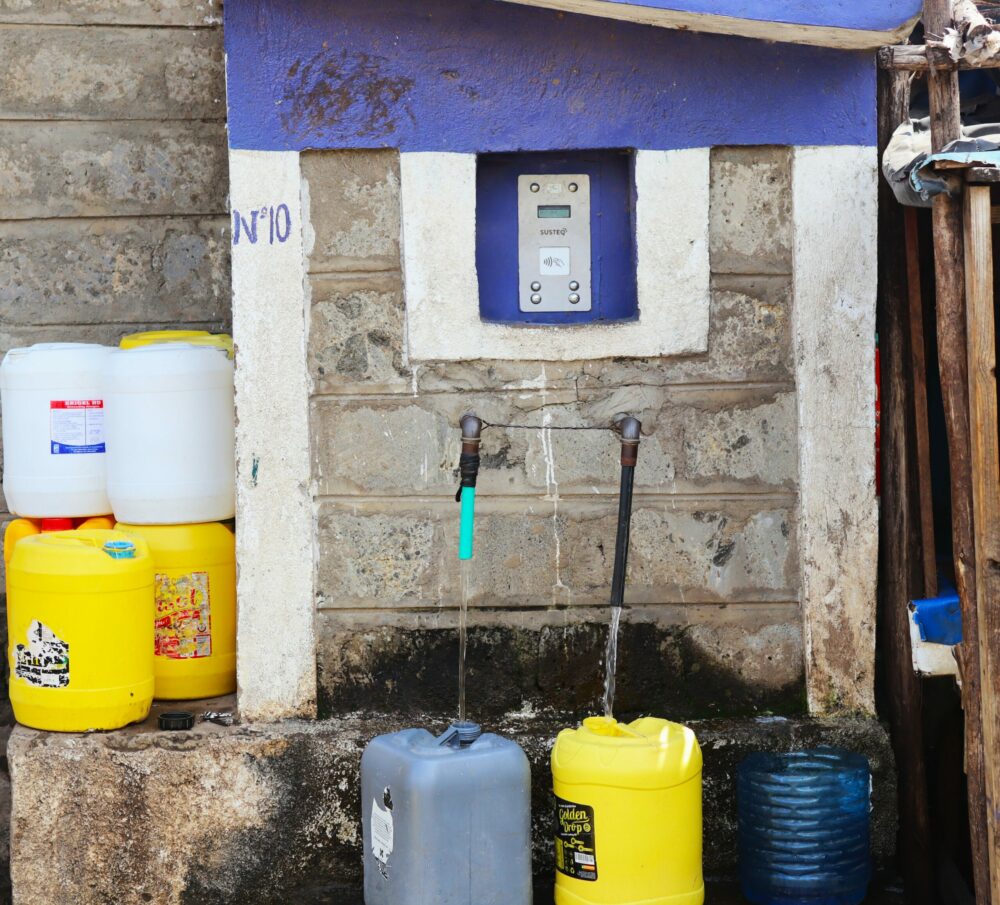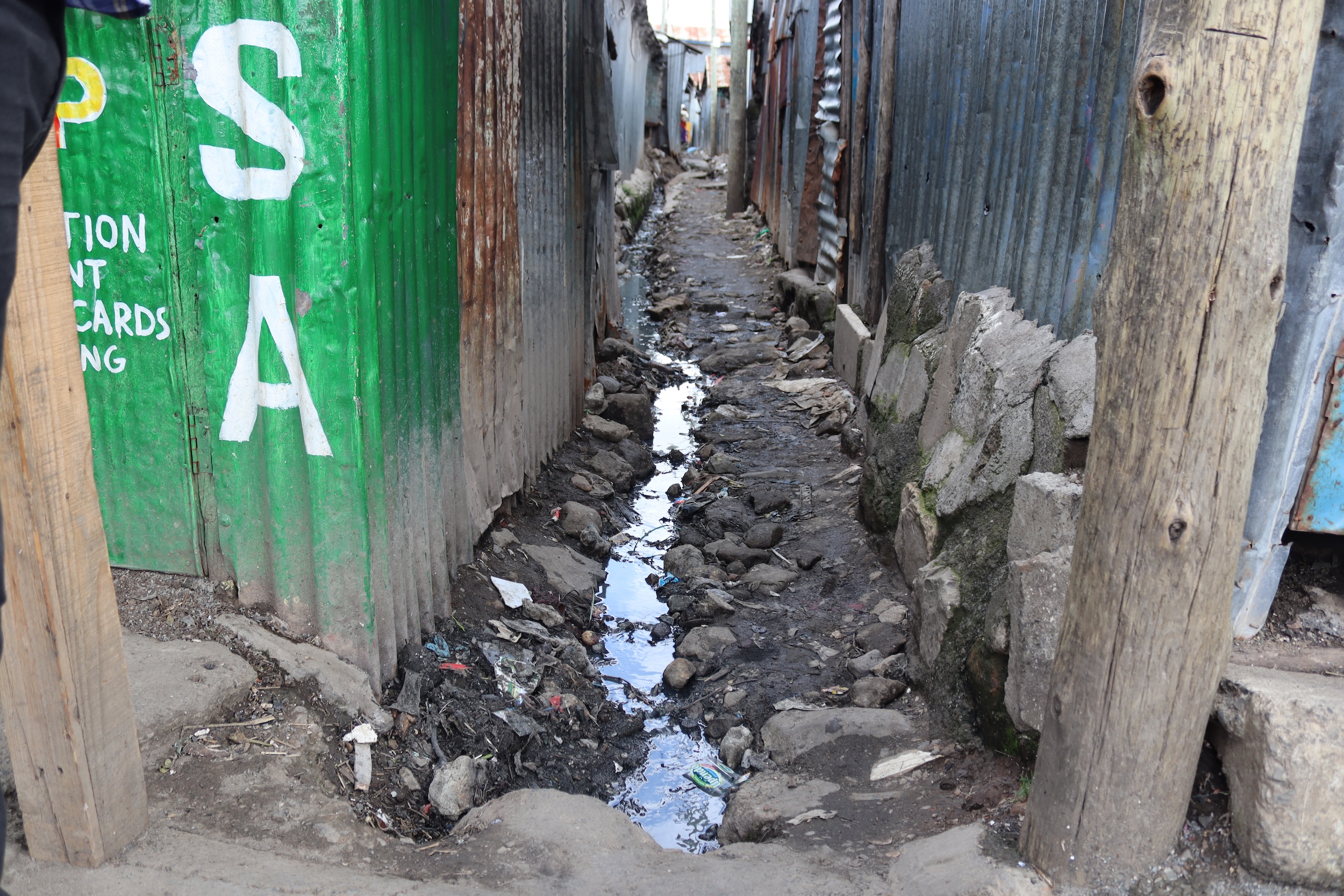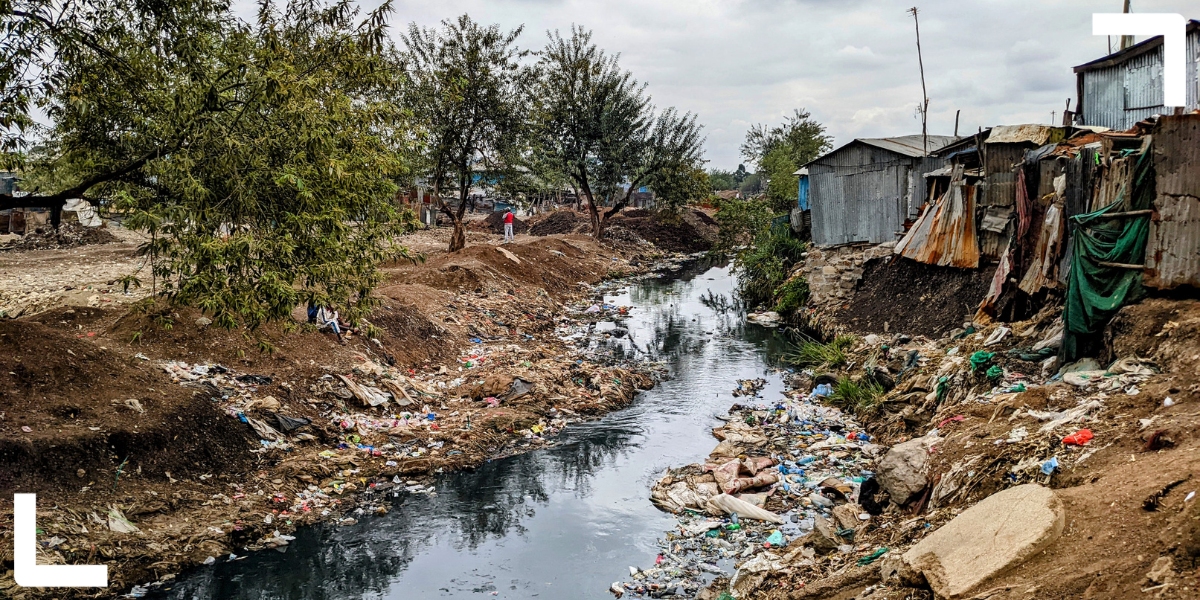By Patrick Njoroge and Evans Otibine
The Mukuru Special Planning Area in Nairobi is home to a population of about 400,000. Approximately 100,560 households occupy 689 acres of land. The informal settlement is situated between the Nairobi Industrial Area and Mombasa Road, comprising of Mukuru Kwa Njenga, Mukuru Kwa Reuben and Viwandani.
The three settlements primarily consist of temporary structures made of corrugated iron, with many families residing in 9m² single-room dwellings. Most of these units are arranged within plots that contain ten rooms organised around a small internal courtyard. Approximately 94% of the residents in these three informal settlements are tenants who pay rent to the owners of the structures, who do not own the land on which they have built.
Water and sanitation challenges
Informal suppliers dominate water and sanitation services in this settlement. Water is distributed by vendors through kiosks or delivered door-to-door using handcarts. The informal, illegal and often chaotic system of piping – commonly referred to as “spaghetti connections” – is characterised by makeshift infrastructure typically laid above ground, making it highly susceptible to damage. Contaminated black water from overflowing pit latrines and drains frequently seeps into these fragile pipes, resulting in polluted water being used for cooking and drinking in households. Spaghetti connections are established by informal providers, who tap into the municipal supply and channel water to neighbourhood taps, where residents are charged exorbitant prices for 20-litre containers. Despite the poor quality and unreliable access, residents face a “poverty penalty”, paying 400-800% more per cubic metre for unsafe water than the official county rates.
Sanitation is mostly characterised by pit latrines that fill up quickly and are manually emptied, with the raw faecal waste dumped into the Ngong River. Residents are charged high fees for accessing the few pay-per-use toilets that exist, while water, which is unreliable and of low quality, costs about ten times the formal rate. The need to establish sustainable service delivery mechanisms to improve water and sanitation is therefore evident.

The Mukuru Special Planning Area
To enable the establishment of sustainable service delivery mechanisms, in 2017, the Nairobi City County Government declared Mukuru Kwa Njenga, Kwa Reuben and Viwandani to be a Special Planning Area. This designation initiated the development and implementation of a Mukuru Integrated Development Plan (MIDP).
Community asks:
Following designation of Mukuru as an SPA, water and sanitation plans were developed after extensive consultation with the residents, and three requests were made:
- That water and waterborne sanitation services from Nairobi City water utility company are provided to the residents.
- That families have access to toilets at the plot level, rather than relying on community toilets.
- That prepaid water dispensers (PPDs) are provided, each one to serve 150 households.
Implementation of Mukuru Integrated Plan:
During the preliminary design phase of Mukuru’s water supply and sanitation systems, the technical team evaluated various options for sanitation and water supply. After extensive analysis, simplified sewer systems (SSS) and PPDs were selected as the best solutions. Simplified sewers enable the construction of a sewerage network using smaller-diameter pipes laid at a shallower depth and on a flatter gradient than conventional sewers. This enables more flexible designs, leading to minimal displacement compared to conventional systems. Specifically, simplified sewers also have the following advantages:
- Lower capital and operational costs compared to conventional sewers.
- Can be extended as the community grows.
- Grey water, such as water used for washing clothes, can be managed concurrently.
- Do not require onsite primary treatment units.
Simplified sewer systems were implemented in Mukuru Kwa Ruben, supported by the national government’s installation of trunk and main sewers. However, the government did not construct lateral sewers, which are necessary for last-mile connections. As a result, civil society organisations (CSOs) stepped in to invest in the construction of these lateral sewers, enabling residents to build plot-level toilets and connect to the sewer network.
To ease water provision, pre-paid water dispensers were adopted, allowing consumers to purchase water using prepaid tokens, thus eliminating the need for billing. Tokens are registered using a person’s national identification card at Nairobi Water offices. Currently, water is charged at one shilling per 20-litre jerrycan, compared to the previous rate of KES 5–20.
To address financial barriers, Akiba Mashinani Trust (AMT), in partnership with FSD-Kenya, established a sanitation revolving fund to support structure owners who lacked the means to construct toilets and pay Nairobi Water connection fees. So far, the fund has helped 127 structure owners build toilets and cover water connection costs, with an average loan per owner of approximately KES 20,000. Additionally, AMT and other CSOs, such as Water Sanitation for the Urban Poor (WSUP), have constructed approximately 3km of lateral sewers, connecting 1,248 plots and benefiting around 12,500 families.
Despite this progress, approximately 80% of residents still do not have plot-level toilets connected to the sewer system. Therefore, significant support is required for the construction of roughly 30km of lateral sewers and the installation of about 500 PPDs in Mukuru.

Partnership between AMT and the African Cities Research Consortium
AMT has partnered with ACRC to document the methodologies, systems and practices employed in expanding water and sanitation services in Mukuru Kwa Reuben through the Special Planning Area, while comprehensively assessing the outcomes of these interventions.
The partnership also seeks to identify and address critical financing gaps, infrastructure deficiencies, community organisation challenges, technical limitations and policy barriers that hinder the effectiveness of ongoing efforts. In parallel, the project will operationalise collaborative frameworks between AMT, Nairobi City County Government (NCCG), Nairobi Water and Sewerage Company (NCWSC), WSUP, the Nairobi Rivers Commission and other stakeholders, with a focus on strengthening and expanding these partnerships.
A key component of the initiative includes extending water and sanitation infrastructure to reach 8,000 households in Mukuru Viwandani. To ensure sustainability, the project will establish robust systems and governance structures to facilitate effective oversight and coordinated management of services, in collaboration with state actors.
Ultimately, the insights gained will contribute to enhancing the existing policy framework for delivering water and sanitation services in informal settlements, through refined methodological approaches.
Note: This article presents the views of the authors featured and does not necessarily represent the views of the African Cities Research Consortium as a whole.
The African Cities blog is licensed under Creative Commons Attribution-NonCommercial-NoDerivatives 4.0 International (CC BY-NC-ND 4.0), which means you are welcome to repost this content as long as you provide full credit and a link to this original post.


